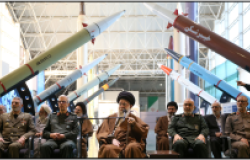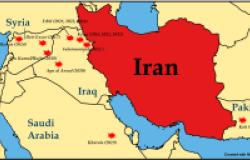After One Year, Reporter Jason Rezaian Remains in Iranian Prison
"Some hoped that Jason Rezaian would be freed once an agreement was reached over Iran’s nuclear program, but the truth is that his fate-–like that of the other American-Iranians serving time–-was never dependent on the outcome of the nuclear negotiations," writes Haleh Esfandiari.

Jason Rezaian may not even know that he has been in jail for a full year. It’s unlikely that Mr. Rezaian, an Iranian American reporter for the Washington Post, and his wife, Yeganeh Salehi, will ever forget men from Iran’s intelligence ministry arriving at their Tehran apartment on July 22, 2014, searching the premises, seizing their computers, and hauling them off to Evin Prison. Ms. Salehi, also a journalist, was released on bail in October. But her husband languishes in prison, and it is hard to keep track of time, let alone days and months, in solitary confinement.
When I was held at Evin Prison, I kept a rough sense of hours by the guards’ shift change: their early-morning arrival and their departure in the evening. But you lose track of the days, and Iranian interrogators do everything they can to confuse those being held. My interrogations took place morning, noon, and night. Some detainees are summoned for interrogation in the middle of the night. I was asked the same questions again and again. They call it “emptying the prisoner of information.” Summer days are long and hot. The sun rises before 4 a.m. and sets around 9 p.m., and the cells are small and suffocating. When I was at Evin Prison, a single air-conditioner in the corridor served the entire ward for female political prisoners. Winter days are short and dark, and a prisoner has little to do but wait—for another day to pass, for another interrogation.
When Mr. Rezaian was summoned to court May 26, 10 months after his arrest, some hoped that the trial would be a face-saving procedure that would result in his freedom. But after three court sessions behind closed doors, Mr. Rezaian is not free. The Revolutionary Court trying him has not issued statements on the proceedings. Mr. Rezaian’s lawyer, Leila Ahsan, was told that the charges against him include espionage, “collaborating with hostile governments,” and “propaganda against the establishment.” No one knows the basis for these charges, and Ms. Ahsan is barred from discussing the proceedings even with her client’s family. She said this week that a fourth and reportedly final court session will be held and judgment announced “soon.”
This entire episode reflects the paranoia of Iran’s security agencies and its pliant judiciary, as well as their obsession with idea that outsiders–chiefly Americans–are plotting a velvet revolution in Iran to dismantle the Islamic Republic. They are forever discovering schemes and spy rings; trying to establish links between journalists or academics (often Iranian-Americans) and imagining networks in Iran committed to regime change. Numerous men and women have been victimized so that Iran’s security agencies and judiciary can justify repression, media bans, arrests, and prison terms.
But they remain at a loss when it comes to providing solid proof. Mr. Rezaian has to be tried in secret because the case against him cannot stand up to scrutiny. The “evidence” against him has not been made public because it is so thin. His lawyer is silenced for the same reason.
Iran’s security agencies and judiciary remain free from accountability. Their activities are never seriously discussed, let alone questioned, in Iran’s Majlis (parliament). President Hassan Rouhani has failed to bring them to heel; and, aside from occasional statements in favor of greater freedoms, he has not really tried. These organizations operate outside the president’s jurisdiction.
Some hoped that Jason Rezaian would be freed once an agreement was reached over Iran’s nuclear program, but the truth is that his fate–like that of the other American-Iranians serving time–was never dependent on the outcome of the nuclear negotiations. Their imprisonment owes directly to the nature of Iran’s intelligence ministry and its judiciary; and only Iran’s supreme leader, Ayatollah Ali Khamenei, can bring an end to the kind of secret trials that severely damage Iran’s international reputation and drive ordinary Iranians to despair. In Mr. Rezaian’s case, one hopes that he will be found not guilty and freed–an unlikely outcome as it involves an admission of error by the judiciary. The next best option would be that he is sentenced to time already served, which would allow him and his family to leave this nightmarish year behind them.
The opinions expressed here are solely those of the authors.
This article was originally published in The Wall Street Journal.
About the Author


Middle East Program
The Wilson Center’s Middle East Program serves as a crucial resource for the policymaking community and beyond, providing analyses and research that helps inform US foreign policymaking, stimulates public debate, and expands knowledge about issues in the wider Middle East and North Africa (MENA) region. Read more










